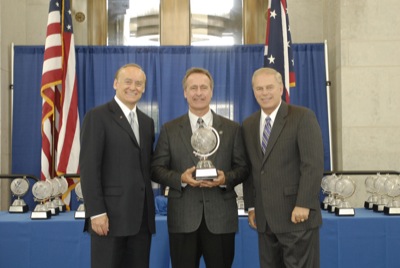Wednesday, July 25th, 2007
Maria Stein doctor learns value of volunteering from work in Honduras
By Margie Wuebker
MARIA STEIN - Dr. Erin Dahlinghaus traveled hours on a plane and then a bus in order to help others at a remote medical clinic in the Honduran mountains.
The 27-year-old pediatric resident spent June 2-10 at the clinic, which has no electricity, no running water and little, if any, medical equipment.
Medical students from the Richmond, Va., area organized the trip and then enlisted the aid of Dahlinghaus and fellow doctors from Inova Fairfax Hospital for Children, near Washington, D.C. Each member of the delegation traveled with two large suitcases - one containing clothing and personal care products; the other chock-full of donated medications.
"We flew into the capital city and were bussed six hours into the mountains to the little village of Pinares," says Dahlinghaus, a 1998 Marion Local High School graduate. "The people are very poor and they walked for hours seeking free medical attention."
Many of the patients suffered from intestinal parasites, scabies, lice and dental problems stemming from poor hygiene practices. They think nothing of drinking from or bathing in streams cattle and other animals also use. Others requested Tylenol or Motrin to treat headaches and muscular pain at home.
With no X-ray machines and only rudimentary laboratory equipment, the visiting doctors had to rely on clinical examinations and their own diagnostic skills.
"There were times I would have given anything for a chest X -ray," Dahlinghaus says. "You become so accustomed here in the States to making a diagnosis based on lab values and pictures."
The doctors examined one girl who showed signs of a possible brain tumor and arranged for her transportation to a larger facility equipped with radiology and surgical departments. The team also made arrangements for a local midwife to help a 17-year-old girl awaiting the birth of her first child.
It was not unusual to find lines of women and children patiently waiting when the clinic opened at 7 a.m. A local girl, trained by the doctor who comes each Thursday, assisted with registering and charting. An interpreter also was on hand to assist those having difficulty with Spanish.
The steady stream tapered to a trickle as the clinic's 4 p.m. closing time neared. As patients embarked on the long walk home, medical personnel walked to a nearby store where they shared backroom space.
"The owners prepared meals and set out their best plates, pots and pans reserved for visiting American doctors," Dahlinghaus says, adding the daily menu consisted of tortillas, refried beans, eggs and plantains fried with brown sugar and butter. "Mexican food is my favorite, but I don't know whether I can eat it anymore."
Part of the crew's work also involved preventative care and instruction.
"We handed out toothbrushes, toothpaste and soap. It was like Christmas in the middle of June," she says.
Little girls with dark eyes tugged at Dahlinghaus' uniform in hopes of obtaining more soap. She complied on occasion and the youngsters left cradling the bars as if they had received some priceless treasure, she recalls.
Dahlinghaus, the daughter of Brian and Bonnie Dahlinghaus, is beginning the second year of a three-year pediatric residency. She earned her doctor of medicine degree in 2006 from the Medical College of Ohio in Toledo. She has yet to decide on an area of specialization, although she admits working at a children's hospital in Ohio is a definite possibility.
The Honduran experience proved to be as eye-opening as it was rewarding, she says.
"The people have so little and yet they are so happy," she says. "We have so much and we take things for granted. Our hospital is organizing a mission trip to Africa and I want to go. People there need help, too."



